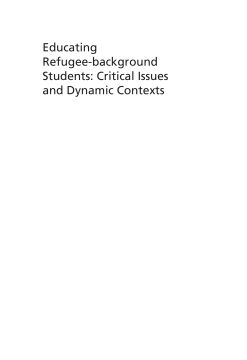
BOOK
Educating Refugee-background Students
Shawna Shapiro | Raichle Farrelly | Mary Jane Curry
(2018)
Additional Information
Book Details
Abstract
This collection of empirical work offers an in-depth exploration of key issues in the education of adolescents and adults with refugee backgrounds residing in North America, Australia and Europe. These studies foreground student goals, experiences and voices, and reflect a high degree of awareness of the assets that refugee-background students bring to schools and broader society. Chapters are clustered according to the two themes of Language and Literacy, and Access and Equity. Each chapter includes a discussion of context, researcher positionality and implications for educators, policy-makers and scholars.
In these pages, socially aware academics have integrated educational and social issues, attending consciously to refugees as whole people. The editors and authors understand how the educational concerns of refugees are inseparable from their political, geographic, cultural and psychological contexts, and are to be commended for producing this worthwhile volume.
With deeply nuanced and textured accounts of the various factors that influence the language, literacy and learning experiences of refugee-background learners of all ages and in many contexts, this volume will be of great value to anyone interested in facilitating refugee-background learners’ access to educational, social and economic opportunity.
This volume offers a wealth of information about what crossing (language) borders means for students with a refugee background. It demonstrates the opportunities modern technology offers them to stay connected to their heritage culture and languages, to create new bonds with host community members, and to foreground their voices. In doing so, it invites educators to go beyond the classroom walls to meet students’ experiences and needs.
Shawna Shapiro is an Associate Professor of Writing and Linguistics at Middlebury College, Vermont, USA, where she also directs the Writing and Rhetoric Program. Her research interests include transitions from secondary to postsecondary education, innovations in teaching writing to multilingual students, and other asset-oriented approaches to teaching and research with linguistically diverse college students. In addition to her scholarly work, she is involved in local initiatives benefitting English learners in her community.
Raichle Farrelly is an Assistant Professor in the Applied Linguistics Department and MA TESOL Program at Saint Michael’s College, Vermont, USA. She is a teacher educator and researcher with a focus on L2 teacher education, reflective teaching, and teaching English to adult refugee-background students. Her first co-authored book, published by TESOL Press, focuses on how instructors can support international students in higher education settings.
Mary Jane Curry is Associate Professor, Department of Teaching and Curriculum, Warner Graduate School of Education, University of Rochester, New York, USA, where she also directs the Writing Support Services. She is co-editor of TESOL Quarterly’s Brief Research Reports section and Multilingual Matters’ series, Studies in Knowledge Production and Participation. Her research focuses on access to academic writing and knowledge production by scholars and students using English as an additional language.
Table of Contents
| Section Title | Page | Action | Price |
|---|---|---|---|
| DOI https://doi.org/10.21832/SHAPIR9979 | iv | ||
| Contents | v | ||
| List of Tables | vii | ||
| List of Figures | viii | ||
| Acknowledgments | ix | ||
| Contributors | xi | ||
| Introduction | 1 | ||
| Part 1 Language and Literacy | 15 | ||
| 1 Recently Resettled Refugee Students Learning English in US High Schools: The Impact of Students’ Educational Backgrounds | 17 | ||
| 2 ‘History Should Come First’: Perspectives of Somali-born, Refugee-background Male Youth on Writing in and out of School | 33 | ||
| 3 Translanguaging Pedagogy to Support the Language Learning of Older Nepali-Bhutanese Adults | 49 | ||
| 4 Girls with Refugee Backgrounds Creating Digital Landscapes of Knowing | 66 | ||
| 5 Sociocultural Literacy Practices of a Sudanese Mother and Son in Canada | 82 | ||
| 6 Narratives of Trauma and Self-healing Processes in a Literacy Programfor Adolescent Refugee Newcomers | 92 | ||
| 7 The Role of English as a Foreign Language in Educating Refugees in Norway | 107 | ||
| Part 2 Access and Equity | 123 | ||
| 8 Bridges and Barriers: Karen Refugee-background Students’ Transition to High School in Australia | 125 | ||
| 9 Educating Refugees through ‘Citizenship Classes and Tests’: Integration by Coercion or Autonomous Agency? | 144 | ||
| 10 Using Photovoice with Cambodian and Guatemalan Youth to Uncover Community Cultural Wealth and Influence Policy Change | 159 | ||
| 11 Swedish Teachers’ Understandings of Post-Traumatic Stress Disorder among Adult Refugee-background Learners | 177 | ||
| 12 Education of Refugee-background Youth in Germany: Systemic Barriers to Equitable Participation in the Vocational Education System | 191 | ||
| 13 Iraqi Refugee-background Adolescents’ Experiences in Schools: Using the Ecological Theory of Development to Understand Discrimination | 208 | ||
| 14 Besides a Degree, What Do Refugee-background Students Gain from College? | 225 | ||
| 15 Conception Versus Reality: The Impact of Migration Experiences on Children’s Educational Participation | 241 | ||
| 16 Afterword | 256 | ||
| Index | 260 |
